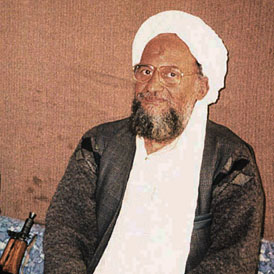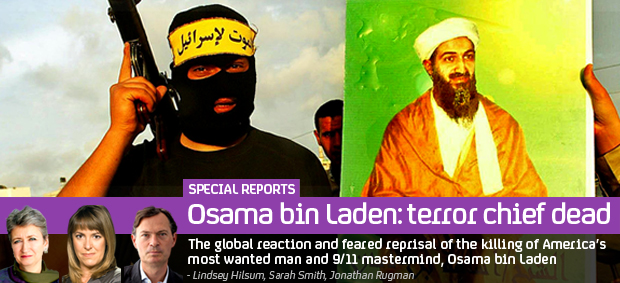Al-Zawahiri appointed al-Qaeda leader
Al-Qaeda appoints Osama bin Laden’s long-time deputy, Ayman al-Zawahiri, as its leader, the group’s command announces in a statement.

“The general command of al-Qaeda announces, after consultations, the appointment of Sheikh Ayman al-Zawahiri as head of the group,” said the statement, issued in the name of the general command and posted on the Islamist website Ansar al-Mujahideen (Followers of the Holy Warriors.)
The Egyptian-born Zawahiri vowed earlier this month to press ahead with al-Qaeda’s campaign against the United States and its allies, in what appeared to be his first public response to bin Laden’s death in a U.S. commando raid in Pakistan in May.
In the video posted on June 8 Zawahiri said: “The sheikh (bin Laden) has departed, may God have mercy on him, to his God as a martyr, and we must continue on his path of jihad to expel the invaders from the land of Muslims and to purify it from injustice.”
“Today, and thanks be to God, America is not facing an individual or a group… but a rebelling nation which has awoken from its sleep in a jihadist renaissance challenging it wherever it is.”
He went on to call this year’s Arab uprisings a disaster for Washington because, he said, they would remove Arab leaders who were the corrupt “agents of America”.
He also pledged allegiance to the leader of the Afghan Taliban, Mullah Omar, calling him “Emir of the Believers”. It was seen by some analysts as an attempt to shore up al-Qaeda’s alliance with the Taliban.
The whereabouts of Zawahiri, who is 59, are unknown. He had been seen as Osama bin Laden’s most likely successor.
He is the son of an upper middle-class family of doctors and is reportedly a qualified surgeon. His father was a professor at Cairo University’s medical school and his grandfather was grand imam of Al-Azhar University.
Analysts say Zawahiri was one of many educated Egyptians who became outraged at the treatment of Islamists by the Nasser regime in the 1960s.
He later became involved in the Egyptian Islamic Jihad movement, before serving a three-year jail term for illegal arms possession linked to the 1981 assassination of President Anwar Sadat, Nasser’s successor.
On his release, Zawahiri went to Pakistan where he worked with the Red Crescent treating Islamist mujahideen guerrillas wounded in Afghanistan, which the Soviet Union invaded in 1979. He is believed to have met Osama bin Laden during this period.
In 1993 Zawahiri took over the leadership of Egyptian Islamic Jihad, and became the main figure in a violent campaign to establish an Islamic state in the mid-1990s.
In 1999 an Egyptian military court sentenced Zawahiri to death in absentia for his role in alleged terrorist activities.
Zawahiri has a $25m bounty on his head for information leading to his capture, and has been placed under sanction by the United Nations.






